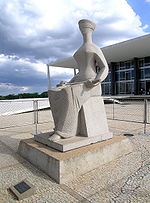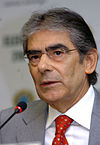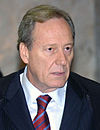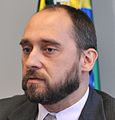- Supreme Federal Court
-
Supreme Federal Court
Supremo Tribunal Federal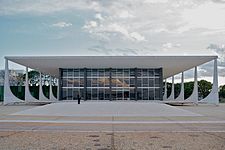
The Supreme Federal Court at the Praça dos Três PoderesJurisdiction Brazil Authorized by Constitution of Brazil Website Official website President Currently Cezar Peluso Brazil 
This article is part of the series:
Politics and government of
BrazilExecutiveJudiciaryGeneral
The Supreme Federal Court (Portuguese: Supremo Tribunal Federal or STF) is the supreme court (court of last resort) of Brazil, serving primarily as the Constitutional Court of the country. It is the highest court of law in Brazil for constitutional issues and its rulings cannot be appealed. On questions involving exclusively lower legislation, the highest court is, by rule, the Superior Court of Justice.
Alongside its appeal competence, mostly by the Extraordinary Appeal (Recurso Extraordinário), the Court has a small range of cases of original jurisdiction, including the power of judicial review, judging the constitutionality of laws passed by the National Congress, through a Direct Action of Unconstitutionality (Ação Direta de Inconstitucionalidade, or ADIn).
The judges of the court are called Ministers (Ministro), although having no similarity with the government body of ministers. They are appointed by the President and approved by the Senate. There is a mandatory retirement age of 70.
All judicial and administrative meetings of the Supreme Court have been broadcast live on television since 2002. The Court is open for the public to watch the meetings.
In May 2009 The Economist called the Supreme Federal Court "the most overburdened court in the world, thanks to a plethora of rights and privileges entrenched in the country's 1988 constitution (...) till recently the tribunal's decisions did not bind lower courts. The result was a court that is overstretched to the point of mutiny. The Supreme Court received 100,781 cases last year."[1]
Contents
History
The court was inaugurated during the colonial era in 1808, the year that the royal family of Portugal (the House of Braganza) arrived in Rio de Janeiro. It was originally called the House of Appeals of Brazil (Casa de Suplicação do Brasil).
The proclamation of the Brazilian Declaration of Independence and the adoption of the Imperial Constitution in 1824 preceded the establishment of the Supreme Court of Justice (Supremo Tribunal de Justiça) in 1829. With the first Constitution of the Republic, the current Court was established.
Although the constitutional norms that regulated the creation of the Court allowed Deodoro da Fonseca, Brazil's first president, to nominate an entirely new Court, the president chose to nominate as the first members of the Supreme Federal Court the ministers who were then serving as members of the predecessor imperial Court.
Two hundred members have served on the Court. The Constitution of 1891 decided that the Court would have 15 members. When Getúlio Vargas came into power, the number of members was reduced to 11. The number was changed to 16 in 1965, but returned to 11 in 1969 and has not changed since. Of all Presidents of Brazil, only one (Café Filho) never nominated a minister.
Chief Justice
The President and Vice-president of the Court are elected by their peers for a term of two years by secret ballot. Re-election for a consecutive term is not allowed. By tradition, the members of the Court always elect as president the most senior minister of the Court that has not yet served as President, to avoid politicization of the Court.
If all members currently sitting on the Court have already served as president, the rotation starts all over again; however, due to the existence of a compulsory retirement age, and the consequent appointment of new ministers to fill those vacancies, it is very rare for the cycle to be completed and re-started, and some ministers are forced to retire before their turn in the presidency arrives.
According to the same convention, the Court selects as vice-president for a certain term the minister who, according to that tradition, will be selected president in the succeeding term. Also by tradition, the elections of the president and vice-president are never unanimous, there being always one isolated minority vote in each election, as the ministers who are to be elected never cast their votes for themselves; such votes are cast either for the Dean of the Court – its most senior member – or for some other elder minister that the one to be elected admires and wants to pay homage to.
Current members
Name Birth Appointed by First day Mandatory retirement 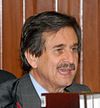
Antonio Cezar Peluso
(President of the Court)September 3, 1942
(age 69)
in Bragança Paulista, São PauloLuiz Inácio Lula da Silva June 25, 2003
(serving for 8 years, 4 months)September 3, 2012 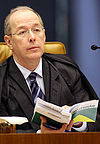
José Celso de Mello
November 1, 1945
(age 66)
in Tatuí, São PauloJosé Sarney August 17, 1989
(serving for 22 years, 3 months)November 1, 2015 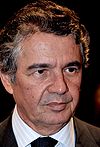
July 12, 1946
(age 65)
in Rio de JaneiroFernando Collor de Mello June 13, 1990
(serving for 21 years, 5 months)July 12, 2016 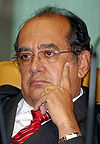
Gilmar Ferreira Mendes
December 30, 1955
(age 55)
in Diamantino, Mato GrossoFernando Henrique Cardoso June 20, 2002
(serving for 9 years, 5 months)December 30, 2025
Carlos Ayres Britto
(Vice-President of the Court)November 18, 1942
(age 69)
in Propriá, SergipeLuiz Inácio Lula da Silva June 5, 2003
(serving for 8 years, 4 months)November 18, 2012 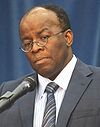
October 7, 1954
(age 57)
in Paracatu, Minas GeraisLuiz Inácio Lula da Silva June 25, 2003
(serving for 8 years, 4 months)October 7, 2024
Enrique Ricardo Lewandowski
May 11, 1948
(age 63)
in Rio de JaneiroLuiz Inácio Lula da Silva March 16, 2006
(serving for 5 years, 8 months)May 11, 2018 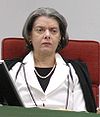
Carmen Lúcia Antunes Rocha
April 19, 1954
(age 57)
in Montes Claros, Minas GeraisLuiz Inácio Lula da Silva June 21, 2006
(serving for 5 years, 4 months)April 19, 2024 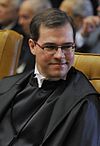
José Antonio Dias Toffoli
November 15, 1967
(age 44)
in Marília, São PauloLuiz Inácio Lula da Silva October 23, 2009
(serving for 2 years)November 15, 2037 
Luiz Fux
April 26, 1953
(age 58)
in Rio de Janeiro, Rio de JaneiroDilma Rousseff March 3, 2011
(serving for 8 months)April 26, 2023 Gallery
-
The Brazilian Attorney General, Roberto Gurgel, is the prosecutor of the Supreme Court.
-
The Brazilian Solicitor-General, Luís Inácio Adams, is responsible for the legal defense of the federal government in Supreme Court cases.
-
José Rômulo Plácido Sales is the public defender in Supreme Court cases.
References
- ^ The Economist:Brazil's supreme court:When less is more May 21, 2009
External links
See also
- Brazil federal courts
 Brazil
BrazilHistory First inhabitants · Colonization · Empire · Old Republic · Vargas Era · Second Republic · Military rule · ContemporaryGeography Regions · States · Mesoregions · Microregions · Municipalities · Islands · Coastline · Climate · Environment · Extreme points · Protected areas · CapitalsGovernment Constitution · Federal government · President · National Congress · Foreign relations · Law · Law enforcement · MilitaryPolitics Economy Society Demographics · People · Languages · Religion · Immigration · Education · Health · Crime · Social issues · Largest cities · ApartheidCulture Supreme Courts of South America Sovereign states Categories:- National supreme courts
- History of Brazil
- Politics of Brazil
- Constitutional courts
- Judicial system of Brazil
Wikimedia Foundation. 2010.

